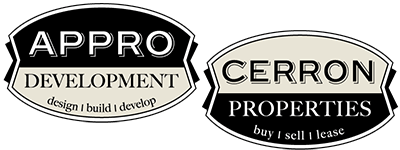Being a landlord and property owner is not for the faint of heart, and this is especially true amid the COVID-19 crisis. There is hope and solutions available to meet the challenges facing many property owners in today’s landscape. The team at Cerron Commercial Properties & Appro Development has prepared a list of action items and a summary of tools you can use to navigate these uncharted waters.
How a landlord can respond
As businesses across the country close their doors in compliance with the response to the COVID-19 pandemic, we are starting to see tenants approaching landlords about their rents. If a business if forced to shut their doors, even temporarily, they are having a hard time generating the revenues they once did, and therefore cannot produce rent. In turn, the landlord may have a difficult time paying the mortgage (if there is one), or taxes, or any of the other costs associated with building ownership. No one wants to be in this situation, and all feel the hardship. According to a recent article published by the CCIM Institute, “Guidance for Rent Relief Requests and Other Commercial Real Estate Tenant/Landlord Issues” a variety of options are available for the landlord to implement in situations like the COVID-19 crisis. You may want to consider these options.
Rent Reduction
The landlord can reduce the tenant’s rent for a portion or all of the term left on the lease. The usual forms of rent reduction are to reduce the base rent, operating expenses, or both. In regard to retail, it is possible to convert base rent to percentage rent.
Rent Deferral
In this case, the landlord can defer a portion of the tenant’s rent but would require them to repay the rent deferred at a later time, either in a lump sum or by increasing subsequent payments. A variation of rent deferral could be to cap or set a base year to operating expenses for a short or extended period of time.
Rent Abatement
If a tenant is significantly past due on rent payments, a landlord may agree to forgive a certain amount of the past due rent if the tenant remains current thereafter.
Loan Conversion
Rather than abating past due rent, a landlord may agree to convert the past due rent into a loan payable over time. The tenant would, however, continue to pay the current rent. The loan is then evidenced by a promissory note that is cross-defaulted with the lease.
Application of Deposit
If the landlord holds a deposit, this amount could be credited against the tenant’s current obligations.
Subletting
Bringing in a new tenant (for part of or all of the rented space) could reduce or eliminate the rent obligations while replacing revenue for the landlord.
Data Source: https://www.ccim.com/rentrelief/?gmSsoPc=1s
*** Keep in mind – a landlord giving any of these concessions should surely be given some consideration as well – so an extension of the length of the lease term is often considered.***

Additionally, we have discussed this situation with many of our clients who own properties and have started a proactive approach to having a conversation with their clients. Some have sent letters to tenants stating some of the following:
- Acknowledge the times we are dealing with and their value as a tenant
- Offer solutions, which may include discussions with their insurance company – possible business interruption insurance and similar experts in their team of advisers
- Include summaries provided by local Chambers of Commerce or municipalities
- Discuss what you as the landlord are doing to try to minimize your costs
- Request that the tenant, after exhausting all options (government programs, savings, lines of credit, etc.), provides documentation to explain their situation
These times are indeed challenging, but as with all successful relationships, keeping the lines of communication open and respectful can be the key to navigating these tough conversations.
Additional Resources
The following are a few additional resources you may find helpful as you work with your tenants.
- Seven Steps to Lease Renegotiations
- SBA Coronavirus relief options available
- Small Business Owners Guide to the CARES Act
Our team is available to help in any way we can. Please contact us with any questions, comments or concerns you may have!
{{cta(‘a783137d-3d9e-4401-98fb-1695e85a9889’)}}
Image Credits: Business person with key and business owner in shop via Shutterstock.
Disclaimer: Appro Development, Inc. and Cerron Commercial Properties, LLC have compiled the above information from multiple sources and make no warranty or representation regarding the information shared above. You and your tax, and/or legal adviser(s) should conduct your own investigation and research regarding the best course of action for you and your unique business.


